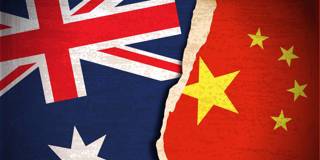There are many legitimate concerns about China’s behavior, including its defiance of international law in the South China Sea, domestic violations of human rights, and discriminatory and overprotective trade and industrial policies. But Australia’s huge economic dependence on China obliges it to get along with its larger neighbor.
MELBOURNE – Australia’s China problem – official contacts frozen and many of our exports under siege – is now gaining attention far beyond our shores. Much of the world, given stark evidence of the economic havoc that China’s displeasure can wreak, and of the ugly depths to which its “wolf warrior diplomacy” can descend, is trying to understand both how we fell into this hole, and whether we can climb out of it with our dignity intact.
How have Australia’s relations with China deteriorated so spectacularly? The short answer is that, although the most recent escalations have come from the Chinese side, for several years Australia has not properly managed the need both to get along with China and to stand up to it. As Geoff Raby, a former Australian ambassador to China, has argued, we have failed to devise a middle way between sycophancy and hostility. Or, to cite the immortal wisdom of the 1930s Scottish labor leader Jimmy Maxton: “If you can’t ride two horses at once, you shouldn’t be in the bloody circus.”
Australia’s huge economic dependence on China – the market for more than one-third of our exports, far more than the United States or any European country – gives us no choice but to get along with our larger regional neighbor. It is fanciful to think we can find alternative markets on that scale any time soon, or perhaps ever.

MELBOURNE – Australia’s China problem – official contacts frozen and many of our exports under siege – is now gaining attention far beyond our shores. Much of the world, given stark evidence of the economic havoc that China’s displeasure can wreak, and of the ugly depths to which its “wolf warrior diplomacy” can descend, is trying to understand both how we fell into this hole, and whether we can climb out of it with our dignity intact.
How have Australia’s relations with China deteriorated so spectacularly? The short answer is that, although the most recent escalations have come from the Chinese side, for several years Australia has not properly managed the need both to get along with China and to stand up to it. As Geoff Raby, a former Australian ambassador to China, has argued, we have failed to devise a middle way between sycophancy and hostility. Or, to cite the immortal wisdom of the 1930s Scottish labor leader Jimmy Maxton: “If you can’t ride two horses at once, you shouldn’t be in the bloody circus.”
Australia’s huge economic dependence on China – the market for more than one-third of our exports, far more than the United States or any European country – gives us no choice but to get along with our larger regional neighbor. It is fanciful to think we can find alternative markets on that scale any time soon, or perhaps ever.